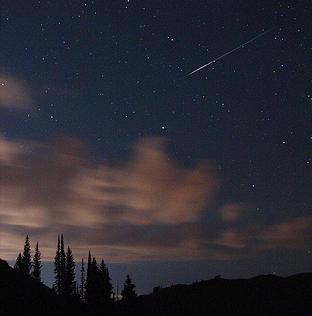
We must start off by saying that a shooting star isn’t actually a star at all. The streaks of light that we see are actually caused by meteoroids entering our planet’s atmosphere. As the meteoroid passes through the atmosphere it burns up and produces a trail of light. As it burns, we call it a meteor and this is what we mistake “shooting stars” to be. If the meteor doesn’t completely burn up in the atmosphere, it hits Earth as a new name, a meteorite.
Shooting stars can be produced by particles as small as a grain of sand! This being said, there are millions of shooting stars everyday. They happen during daytime hours and nighttime hours alike. When you look up at the sky though, you can only see about .005 percent of the total area of the sky. Even with this limited viewing range, on a typical night expect to see a shooting star every ten minutes to fifteen minutes.
| Annual Meteor Showers: | |
|---|---|
| Name | When They Occur |
| Quadrantids | January 1-6 |
| April Lyrids | April 19-24 |
| Eta Aquarids | May 1-8 |
| Delta Aquarids | July 15- August 15 |
| Perseids | July 25 – August 18 |
| Orionids | October 16-27 |
| Taurids | October 20-November 30 |
| Leonids | November 15-20 |
| Geminids | December 7-15 |
The above times every year are the most likely chances to see meteor showers. Meteor showers in the middle of August are known to be quite spectacular. For tips on viewing meteor showers, visit Stardate.org.